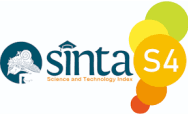Eufemisme dan Disfemisme dalam Karangan Emha Ainun Nadjib: “Hidup Itu Harus Pintar Ngegas dan Ngerem”
Abstract
Changes in the meaning of words with refinement (euphemism) and refinement (dysfemism) occur at the level of a sentence marked by words, phrases and clauses. The purpose of this research is to describe the forms of euphemisms and dysphemisms in the essay of Emha Ainun Nadjib (Cak Nun) with the title "Life Must Be Clever Ngegas and Ngerem" through a component analysis. The paradigm in research uses qualitative by referring to the natural axioms of reality, the relationship between the researcher and the one being studied, the possibility of generalization, and the causal relationship. The data in this study are in the form of sentences in Cak Nun's essay which are included in the process of changing the meaning of euphemisms and dysfemisms. The data is taken from a book entitled "Life Must Be Smart and Ngerem", an article that contains motivation and teachings of life based on Islamic law. The data analysis process in this study includes four stages, namely domain analysis, taxonomic analysis, component analysis, and cultural theme analysis. The results in this study contain a form of euphemism with two modes of use, namely protection and motivation. Meanwhile, dysphemism has two modes of use which include negative evaluation and satire. The four modes are then combined with the equivalent words in accordance with the context of the sentence, giving rise to comparisons based on the meaning components contained. Comparison of meaning components aims to determine the level of meaning change which refers to refinement and roughing. There is one word without comparing the meaning component with its equivalent, namely the word pramonyet. The term pramonyet is used as a form of curbing which refers to the process of comparing human needs with a monkey.
Keywords
Full Text:
PDFReferences
Amilia, F. & Anggraeni, A.W. (2017). Semantik: Konsep dan Contoh Analisis. Malang: Madani.
Chaer, A. (2013). Pengantar Semantik Bahasa Indonesia. Jakarta: Rineka Cipta.
Heryana, N. (2019). Eufemisme dan Disfemisme Pada Media Berita Daring Republika: Perkembangan Kasus Setya Novanto Edisi Januari 2018. Jurnal Visi Ilmu Pendidikan, 62-76.
Jayanti, R., Maulida, N., Musdolifah. (2019). Eufemisme dan Disfemisme Pada Judul Berita Surat Kabar Harian Balikpapan Pos Periode April-Mei 2018. Basataka, 77-86.
Kurniawati, H. (2011). Eufemisme dan Disfemisme dalam Spiegel Online. Litera: 51-63.
Ullman, S. (2014). Pengantar Semantik. Yogyakarta: Pustaka Pelajar.
Santosa, R. (2017). Metode Penelitian Kualitatif Kebahasaan. Surakarta: UNS Press.
DOI: https://doi.org/10.32528/bb.v6i1.4031
Refbacks
- There are currently no refbacks.
Copyright (c) 2021 BELAJAR BAHASA: Jurnal Ilmiah Program Studi Pendidikan Bahasa dan Sastra Indonesia

This work is licensed under a Creative Commons Attribution 4.0 International License.
Address:Jl. Karimata No. 49 Jember-Jawa Timur-Indonesia
Phone & Fax:(0331)336728 | 337957
Email:belajarbahasa@unmuhjember.ac.id









